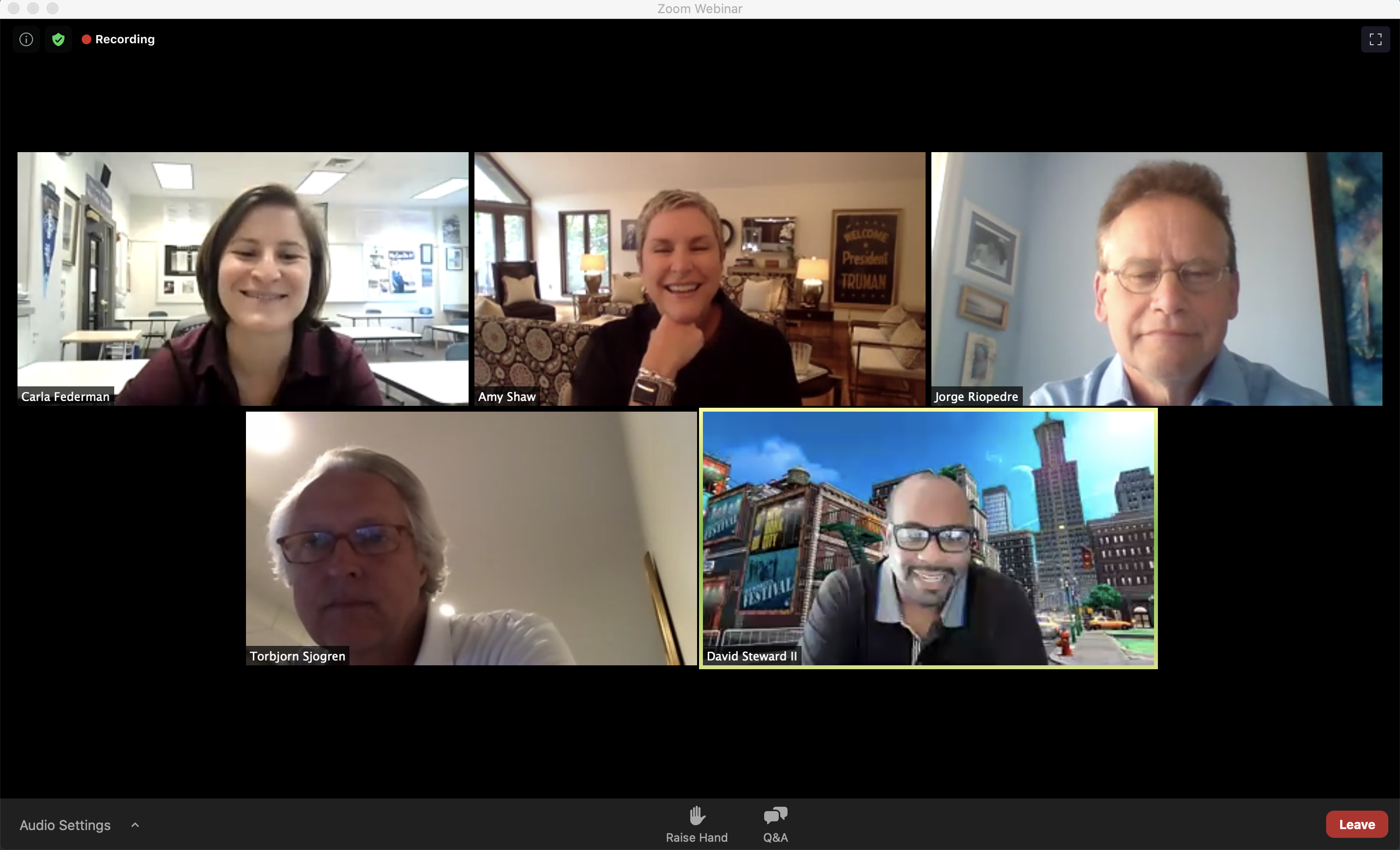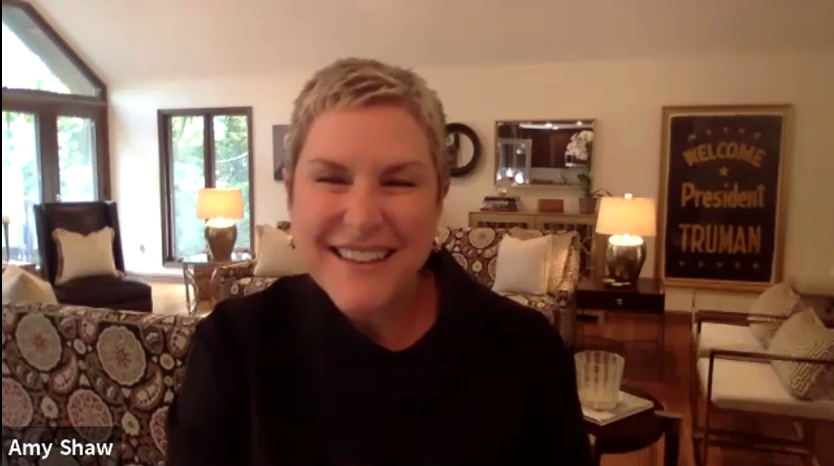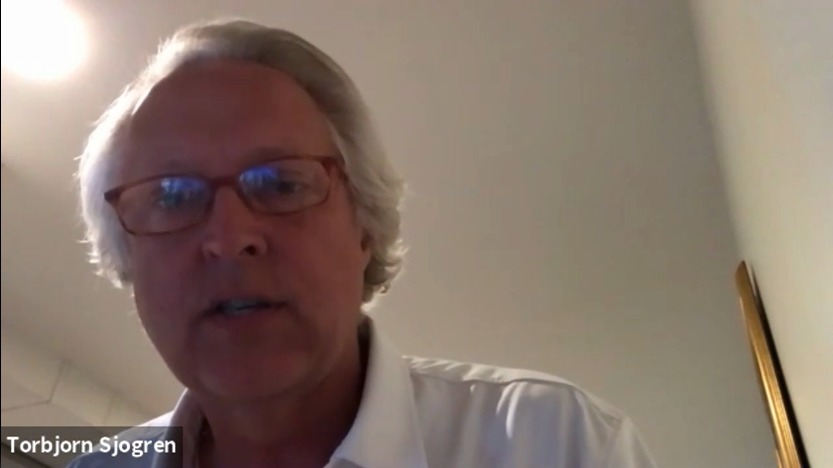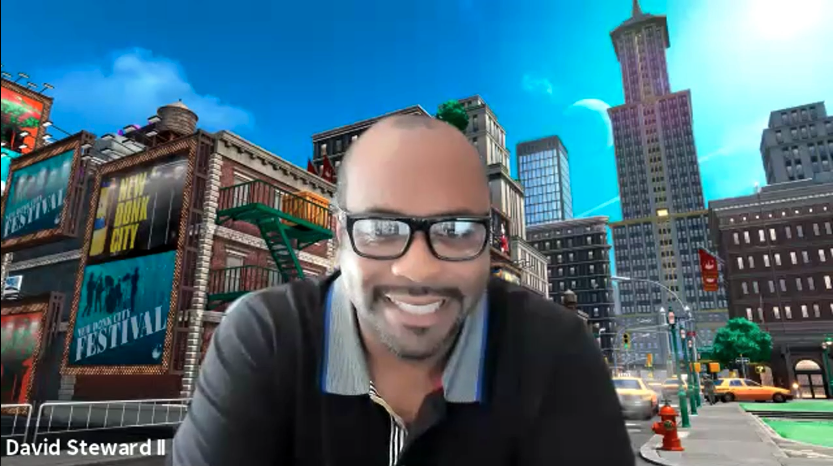Our 11th grade History of St. Louis class hosted a fascinating economics panel for the junior class via Zoom last week. The four panelists, in addition to being leaders in the business world, all had connections to MICDS. Panelists included:
- Jorge Riopedre, Executive Director of Delmar DevINe, MICDS Parent of Alum
- Amy Shaw, President & CEO of Nine Network, Spouse of MICDS Faculty
- Torbjorn Sjogren, Vice President of International Government and Defense for Boeing, Current MICDS Parent and Parent of Alumni
- David Steward II ’95, CEO of Lion Forge Labs & Polarity, MICDS Alum and Current Parent
After introducing themselves, the panelists were asked a number of student-generated questions as moderated by JK-12 History & Social Sciences Department Chair Carla Federman. They first discussed the challenges that St. Louis posits on their respective company or organization as well as the assets that the city offers their business. Both Steward and Sjogren shared how attracting enough talent can be a challenge. Sjogren said, “We are always looking to hire…we are looking for a lot of people particularly in the engineering community. Getting the right talent has been a challenge and, frankly, getting diverse talent has been a challenge.”
Along these same lines, Riopedre reflected on remarks he recently heard from a speaker in St. Louis. The speaker shared that the business opportunities in St. Louis are enormous and if the issue of systemic racism could be solved, “people would be beating down our door.” The social and economic impact that systemic racism has played is something that the organizations of all four panelists are addressing in some way.
A challenge that Shaw noted was about our own perception of St. Louis. “I think that St. Louis thinks of itself as a ‘less than’ kind of place. We have an ingrained narrative that we’re not quite as good as.” She stated that this impression needs to be shifted and there is a lot of intentional work in progress and needing to be done to bring about this change. She also spoke to some of the assets of St. Louis: “All of us on this panel have chosen to be in St. Louis…because of cost of living, because of the connectivity, because of the people.”
The panelists then went on to say what impact their organization has had on St. Louis and what responsibilities businesses have to their communities. Nine Network has been providing educational services during the pandemic and showcasing joyful moments of St. Louis while also focusing on issues that need to be addressed. “Our responsibility is to really be authentic and hold a mirror up to our region in ways that really make us proud and showcase the things that make us proud but also really point to things where we need to address and we need to invest,” Shaw said.
Steward echoed this sentiment. “When we built our company, it was all about [asking] how can we produce content that is inclusive and representative of everybody?” His company showcases many of the marginalized voices in the community. He also said that we need to define our city ourselves. “We’re not really good at telling our own story to the rest of the world,” he explained. “We’ve let news media outlets who have come here define what the city is…There’s a lot of other things going on here, and we all need to be cognizant of how we’re putting out those messages.”
“We need to expand the definition of what creating value is,” Riopedre added. “It has to be about investment in the community.” Sjogren talked about the corporate and local commitments that Boeing has enacted to be a positive part of the community, recently investing more than ever on racial equity and social justice nonprofits.
Federman then asked the panelists to talk about how the pandemic has impacted their work, and in closing, they were tasked with thinking to the future, offering up suggestions and thoughts to students who are thinking about going into business. She asked the panelists to share why they’d advise our juniors to set up their business in St. Louis and be part of the economy here. “I would say that you’re needed,” said Shaw. “I also think there’s something to be said about being a bigger fish in a smaller pond; you can accomplish a lot.”
Riopedre talked about the importance of using an MICDS education not just to be elite, but to make society better. “Whatever you do…take the education that MICDS is affording you and use it to better the society in which you live,” he said.
Watch the full panel discussion below!
For the History of St. Louis class, students wrote down many of their takeaways from the economics panel. Check out some of their reflections below:
- Dan Ye ’22: “I personally really enjoyed the economics panel as it really shifted my perspective on St. Louis’ economic future. One thing the speakers mentioned that changed the way I thought about St. Louis was how we as a city could achieve economic growth by focusing on our weaknesses. I had previously believed that St. Louis was on an economic decline and would require the relocation of many large companies in order to recover. However, one thing that Mr. Steward and Ms. Shaw talked about was how St. Louis could educate and support the less fortunate, which could eventually lead to a larger and more talented workforce.”
- Selina Balci ’22: “One thing that caught me was how much these businesses gave back to the community; even those who have a national or even global presence had a local impact as well. Torbjorn Sjorgen talked about how Boeing regularly donates to nonprofits, typically to educational causes, and has recently focused mostly on racial equity and social justice organizations. I thought that was really great that such a massive company was committed to being a positive part of the community on a local scheme as well, and it was something that I had not expected.”
- JaKenzie Brown ’22: “The speakers reminded me of all the cool opportunities in St. Louis. I could work at Boeing and work with aircraft or I could work as an artist at Lion Forge. Or I could follow in their footsteps and start my own small business! I already knew that St. Louis was great for entrepreneurs, but it was nice actually getting to hear business from their perspectives. I also enjoyed having four different speakers because it highlights the different types of opportunities life has to offer. It was inspiring how people with incredibly different visions could all be successful in their own ways. With hard work and dedication, any idea can blossom into an amazing idea.”
- Ellie Gira ’22: “I was really impressed by all the passion and work that the panelists do to enrich the city, even from such different fields of business. They all have a genuine drive to improve the world beyond the scope of economics, starting with St. Louis. It was interesting to get a glimpse into the daily interactions between St. Louis and the local businesses.”
- Annabelle Abramov ’22: “David Steward spoke about how in LA, there is almost a media and content bubble of what LA thinks is good content to produce, but for David, living in St. Louis grounds him and allows him to make content that is much more appealing to what the people want and connect to. St. Louis is a place of realism. We are not shiny and plastic like LA, big and flashy like Vegas, or urban and edgy like NY. However, we are a city of diversity. We are rich with a variety of culture and shared- and differing- experiences. We are a microcosm of the United States and can thus show what the people really want and need. Also, I didn’t know that St. Louis was a place of such great connections business-wise. Amy Shaw spoke about how connected STL was and how it is so easy to get things done because there are always connections to people who can do it.”
- Amani Hendricks ’22: “All the speakers agreed that St. Louis needs to solve systemic racism and that it’s up to businesses to lead the community. It’s a good sign that major business owners recognize where and how they can improve their business and the community, but I also feel as if it’s time to actually take action and move forward. It’s good to recognize the issue, but at some point, change needs to happen. The speakers mention three main ways we can move forward: hiring more diverse talent, focusing on all areas of value (not just stocks), and investing in underdeveloped communities.“
- Jackson Strelo ’22: “I think the most valuable thing that I learned wasn’t any individual fact or statement, but I was able to observe the panel speak from both a business and economic perspective (being slightly different according to background and expertise in an industry) while keeping morals in mind as well as personal wants and interests…I now understand that employees and executives of businesses and organizations are often motivated and inclined to consider the impacts that they create through interpersonal decisions as well as the product that they develop. For example, Dave Steward II wished to advocate for diverse representation in comic books and animation, and while becoming the leader and executive of this (now) large company, he delivered an extremely pivotal product that has since made a social impact on that market and the individuals involved. This does not only apply to Dave, though, as each panel member has been involved in fundamentally similar yet unique processes and/or productions that have involved making decisions or creating a product that is considerate of a community or even a larger market.”
Thank you to all of our panelists for taking the time out of their busy schedules to inspire our juniors! Maybe some of them will partner with you on a business, economic, or social impact endeavor one day!





